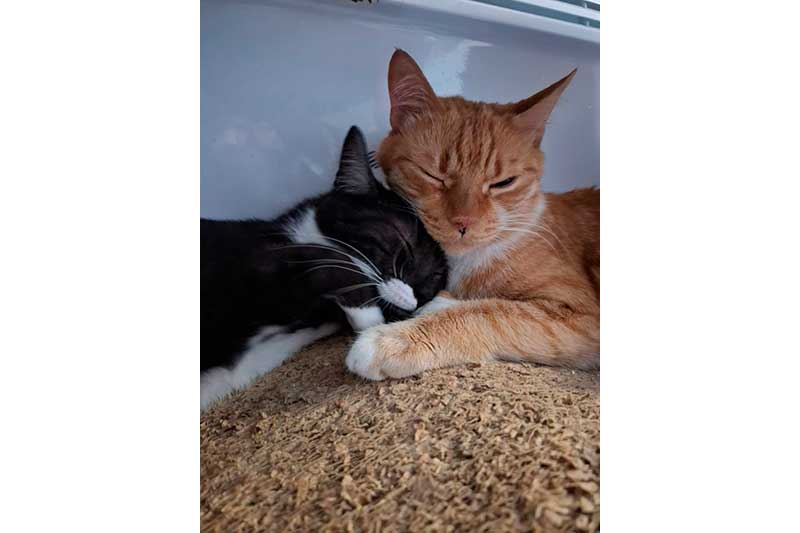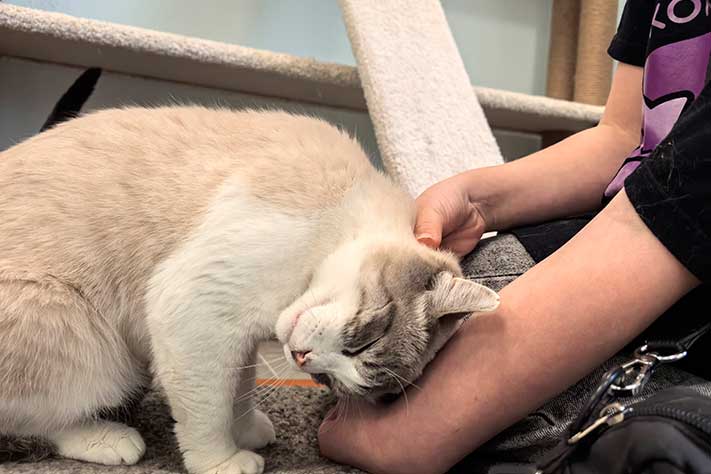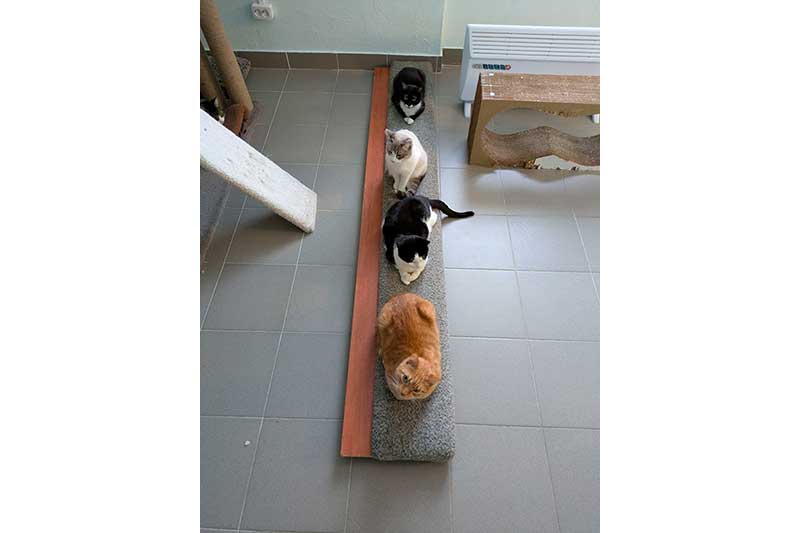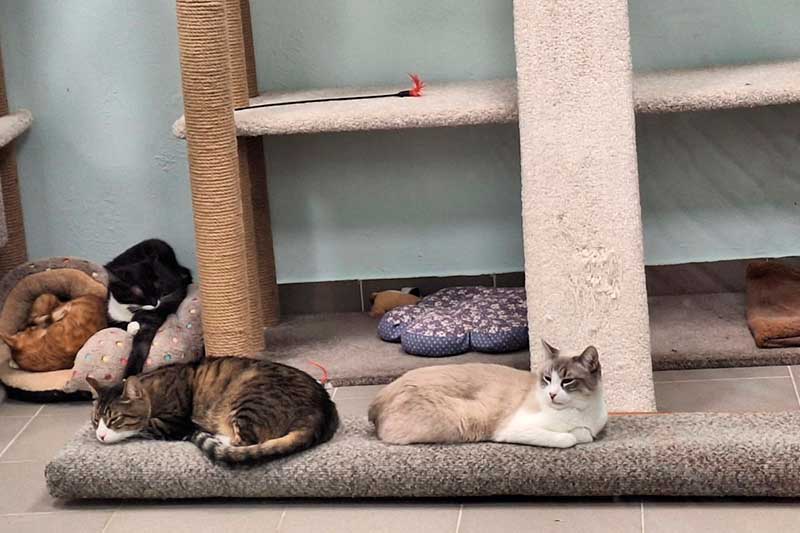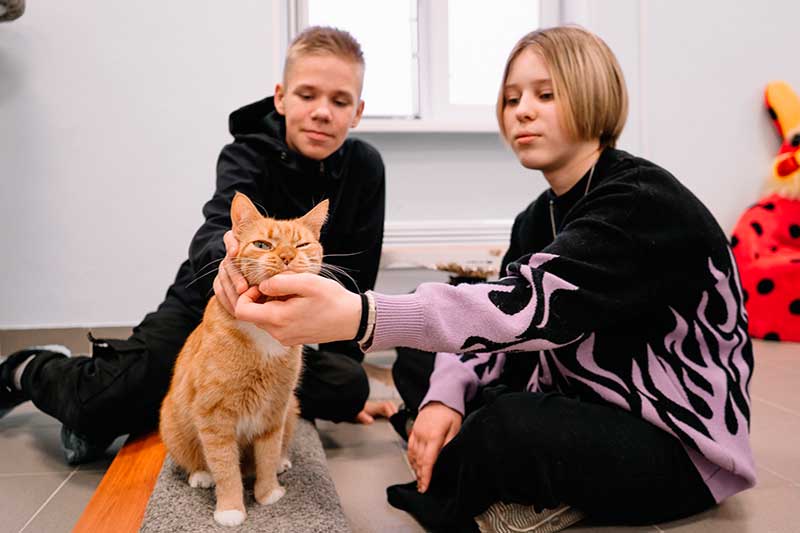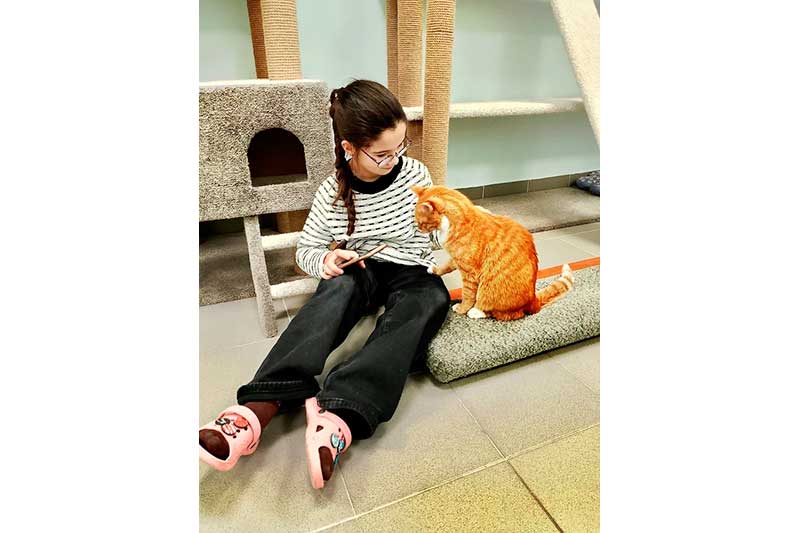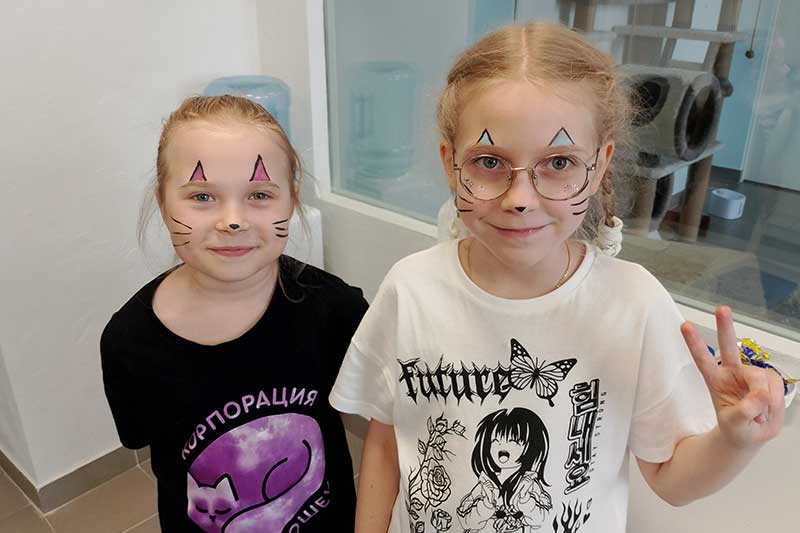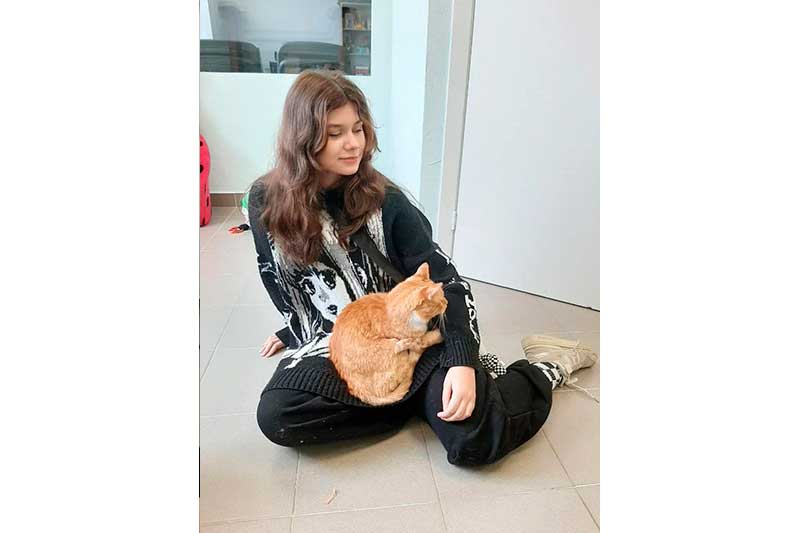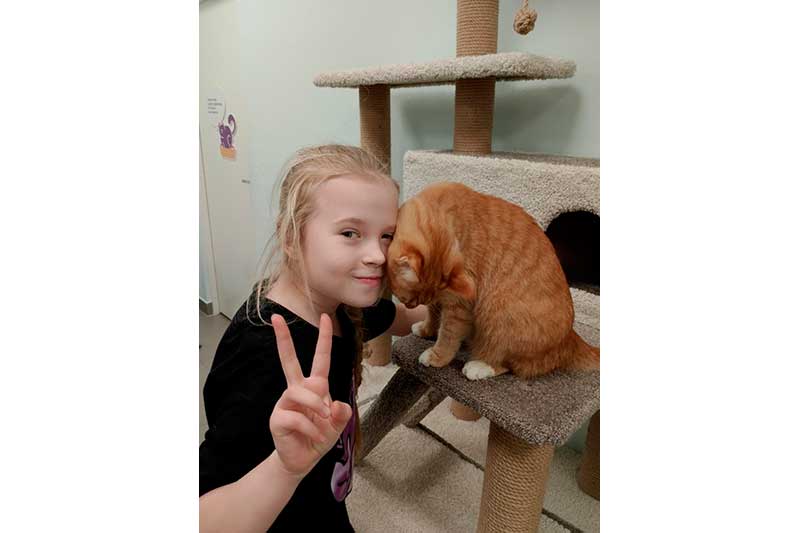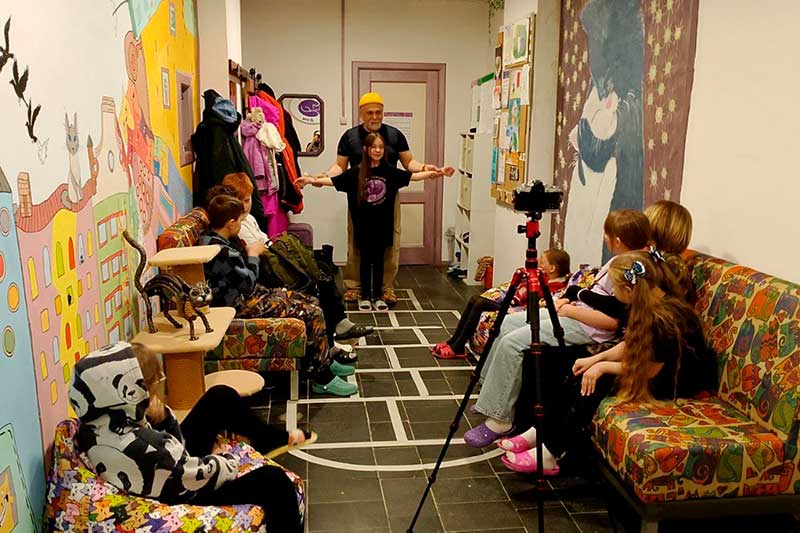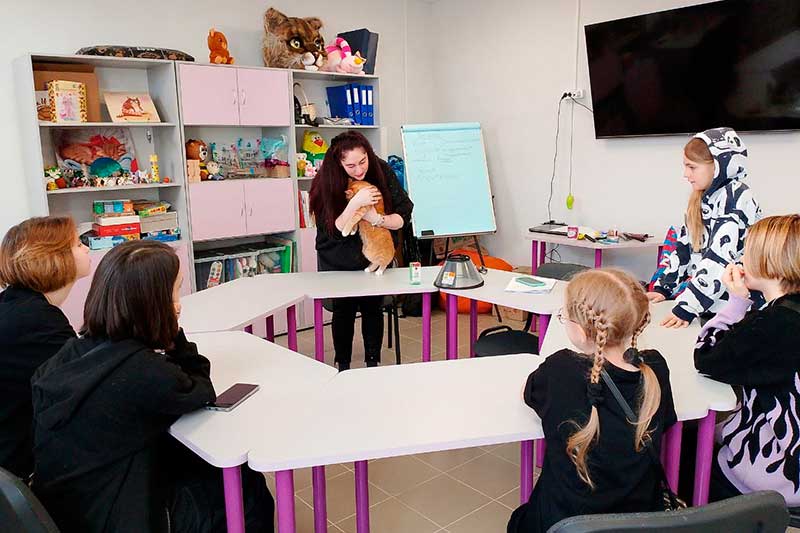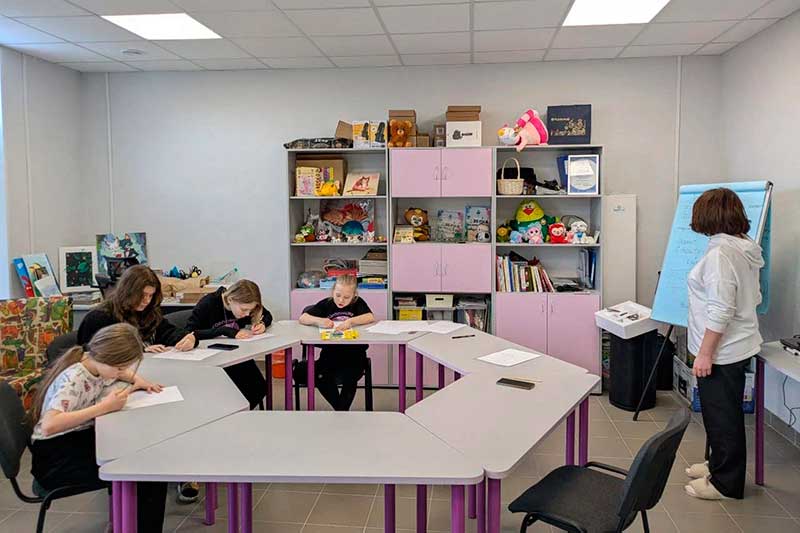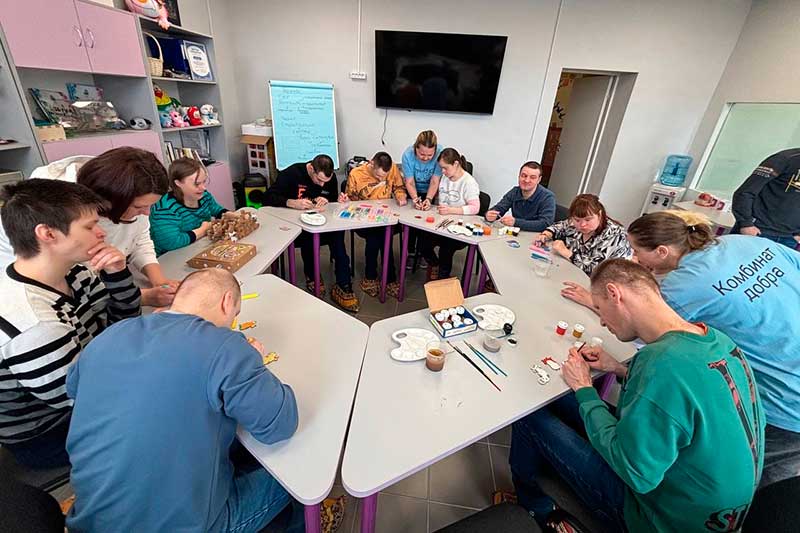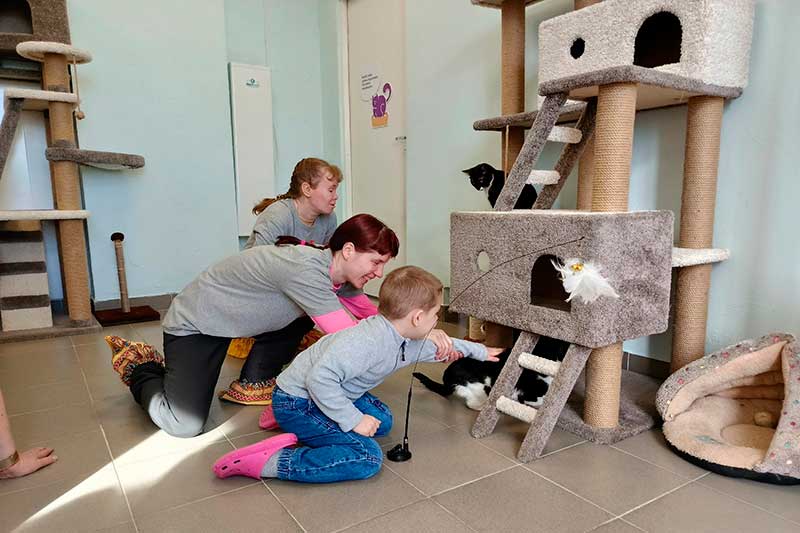Formula for a successful project: cats and children
Svetlana Mikhailenko is the founder of the Kote Team, which helps homeless animals, and the head of the volunteer project Cat Corporation in Monchegorsk. The project is very popular in the city and teaches children to treat our feline friends responsibly.
– How did you decide to become a volunteer?
– I have been a member of the non-profit organization Proshkin Dom (Proshka's Home) for a long time, helping homeless cats. It's not a shelter, it's a temporary home. Volunteers pick up cats from the streets of Monchegorsk, treat them, sterilize them, and find good homes for them. I joined the Combine of Good Program as soon as it appeared at Nornickel.
First, I joined one of the teams that was laying eco-trails in the Lapland Nature Reserve. In 2020, I teamed up with like-minded people to create a volunteer group called "Kote", which means "a team of brave totem ecologists."
– I have been a member of the non-profit organization Proshkin Dom (Proshka's Home) for a long time, helping homeless cats. It's not a shelter, it's a temporary home. Volunteers pick up cats from the streets of Monchegorsk, treat them, sterilize them, and find good homes for them. I joined the Combine of Good Program as soon as it appeared at Nornickel.
First, I joined one of the teams that was laying eco-trails in the Lapland Nature Reserve. In 2020, I teamed up with like-minded people to create a volunteer group called "Kote", which means "a team of brave totem ecologists."
We were the first in the Poneslos eco-marathon to propose a zoo volunteer project. We had no experience, so we failed to convey the social significance of this matter right away. But we didn't give up, and the Chance Project started operating the following year. The team members picked up cats, spayed them, and kept them in their homes for a while. When it was not possible to find a new home for them, we released the animals back into their natural habitat.
– Are there many cats that have found homes?
– To be honest, not many. People are not eager to adopt “wild,” unsocialized animals. Dozens of cats, even tame, domesticated, and cute ones, wait patiently for their owners at Proshka's Home. We knew that we couldn't solve the problem of homeless animals this way. We need to change people's attitudes toward our feline friends. It is essential to start with children, as adults are often held captive by preconceptions.
– Are there many cats that have found homes?
– To be honest, not many. People are not eager to adopt “wild,” unsocialized animals. Dozens of cats, even tame, domesticated, and cute ones, wait patiently for their owners at Proshka's Home. We knew that we couldn't solve the problem of homeless animals this way. We need to change people's attitudes toward our feline friends. It is essential to start with children, as adults are often held captive by preconceptions.
We ran educational sessions in kindergartens and schools, where we talked about cats and the importance of sterilization in reducing the stray animal population. Even within our team, many people had doubts about whether it was appropriate to discuss such matters with small children. But I was certain that everything could be explained simply, clearly, and without physiological details.
This strategy proved successful. Children started coming home and asking, “Is our cat spayed?” Many parents thought about this for the first time and took their pets for surgery.
So we saw that the path of enlightenment was the right one. Two years after the launch of the Chance Project, the Cat Corporation was born.
– What kind of project is this?
– Basically, it's a club or leisure center for kids where we get them involved in volunteer activities. The project is getting a grant from the Kola Endowment Fund, which has just opened in Monchegorsk. The Administration has made a space available for us. It is divided into two parts: one houses 8–10 cats from Proshka's Home, while the other is used for outreach activities.
There is a glass wall between the two rooms so that children with allergies can at least watch the animals. Meanwhile, everyone else freely goes inside, cleans up after the cats, plays and interacts with them.
– What classes do you offer?
– A wide variety. We explain how to provide proper assistance to homeless animals and promote responsible attitudes toward them. We have issued notebooks bearing the message, Please Consider Carefully Before Getting a Pet. You'll find there all the stuff about keeping animals that you should know before you start.
The photographer teaches children how to take pictures of cats, set up lighting, and compose shots. Thursdays are reserved for the young naturalist journalist club. The children learn what storytelling is and how to write posts for social media. We recently recorded podcasts where children talk about sterilization, and they immediately became popular! It is one thing when experts speak in their own specialized language, but it is completely different when children present simple and clear information.
So we saw that the path of enlightenment was the right one. Two years after the launch of the Chance Project, the Cat Corporation was born.
– What kind of project is this?
– Basically, it's a club or leisure center for kids where we get them involved in volunteer activities. The project is getting a grant from the Kola Endowment Fund, which has just opened in Monchegorsk. The Administration has made a space available for us. It is divided into two parts: one houses 8–10 cats from Proshka's Home, while the other is used for outreach activities.
There is a glass wall between the two rooms so that children with allergies can at least watch the animals. Meanwhile, everyone else freely goes inside, cleans up after the cats, plays and interacts with them.
– What classes do you offer?
– A wide variety. We explain how to provide proper assistance to homeless animals and promote responsible attitudes toward them. We have issued notebooks bearing the message, Please Consider Carefully Before Getting a Pet. You'll find there all the stuff about keeping animals that you should know before you start.
The photographer teaches children how to take pictures of cats, set up lighting, and compose shots. Thursdays are reserved for the young naturalist journalist club. The children learn what storytelling is and how to write posts for social media. We recently recorded podcasts where children talk about sterilization, and they immediately became popular! It is one thing when experts speak in their own specialized language, but it is completely different when children present simple and clear information.
The plan is to teach children how to carry out projects. There are now many different competitions for teenagers to participate in. We want to involve children in socially important activities and inspire them to believe that they can change the world themselves.
– Is there any progress yet?
– Certainly! The children have become more open and confident. Even though they're different ages, they've come together as a team and help each other out. The children absorb everything like sponges, show initiative, and are ready to participate in any activity, whether it be weaving rugs or repairing cat houses.
– Is there any progress yet?
– Certainly! The children have become more open and confident. Even though they're different ages, they've come together as a team and help each other out. The children absorb everything like sponges, show initiative, and are ready to participate in any activity, whether it be weaving rugs or repairing cat houses.
Actually, there's a never-ending battle for the mop at the Cat Corporation. Everyone wants to mop the floors. The school has now canceled duty rosters, and some children are not allowed to clean at home, even though they really need to. Children want to work productively. I am happy that they are gaining experience here that will serve them well in their adult lives.
Parents of shy, introverted children note that they have improved relationships with their peers and made more friends. Communication proved to be beneficial even for cats. One cat kept hiding from the volunteers, but the children at the Cat Corporation helped him socialize. Now he lets you pet him and enjoys playing.
I believe that nothing will change until we raise a responsible generation. It's a lengthy process, but any good deed spreads like ripples on water. It would be a victory even if only three of our 80 participants continue our activities.
– Have any children attempted volunteering?
– Yes, we have a project called “Warm Cats,” which received a grant from the People of the Territory Program, formerly known as the World of New Opportunities. Together with the Kigurumi team, we visit a boarding school for children with disabilities. Once, during a visit to the boarding school, I told the pupils about the Cat Corporation. Needless to say, they immediately wanted to visit us, and we made it happen.
Thus, the idea for the Warm Cats Project was born. Now, the kids from the boarding school visit us twice a month. Many of the boarding school students had never had contact with cats before, and it was a real discovery for them.
– Have any children attempted volunteering?
– Yes, we have a project called “Warm Cats,” which received a grant from the People of the Territory Program, formerly known as the World of New Opportunities. Together with the Kigurumi team, we visit a boarding school for children with disabilities. Once, during a visit to the boarding school, I told the pupils about the Cat Corporation. Needless to say, they immediately wanted to visit us, and we made it happen.
Thus, the idea for the Warm Cats Project was born. Now, the kids from the boarding school visit us twice a month. Many of the boarding school students had never had contact with cats before, and it was a real discovery for them.
Our young volunteers play with children from the orphanage and help conduct master classes. We plan to make a film about feline therapy, or therapy with cats, based on this example of communication. We are sure that it helps. This makes life at the boarding school more fulfilling and interesting for the kids. The more children help people and animals from an early age, the more hope there is that the world will become a better place in the future.
– What are your plans for the future?
– From July, we will be scaling up the Cat Corporation to take in more children. The Kola Foundation has allocated funds for the renovation of additional premises. Some schools in Monchegorsk complain that we don't invite them, but now we will be able to reach them too. We also plan to hold events for the youngest children and for the whole family. We will watch movies, read books, and hold discussions.
However, my most cherished dream is to build a shelter for cats. I hope that it will come true someday.
– Why did you become a volunteer?
– I firmly believe that everything in this world depends on us. One must start changing the world with oneself. Nornickel offers great opportunities for this. Including not only financial support but also training. Many people say they don't know how to write projects. But five years ago, I didn't know how to write them either, I didn't know how to draw up contracts. Nornickel offers training programs for volunteers, and experienced colleagues are on hand to provide guidance.
Last year, volunteers from the Kapibara Team joined the Cat Corporation. They love animals, but tend to prefer dogs. I suggested that they do their own project, took them to the Dom s Khvostom shelter (House with a Tail), and we held a clean-up day there. Hopefully, they'll make it work, and I'm always here to help.
You should become a volunteer at least to expand your management and organizational skills and become immersed in a new field of knowledge. These skills will always be handy and may even change your life. Most successful individuals started out as volunteers.
– From July, we will be scaling up the Cat Corporation to take in more children. The Kola Foundation has allocated funds for the renovation of additional premises. Some schools in Monchegorsk complain that we don't invite them, but now we will be able to reach them too. We also plan to hold events for the youngest children and for the whole family. We will watch movies, read books, and hold discussions.
However, my most cherished dream is to build a shelter for cats. I hope that it will come true someday.
– Why did you become a volunteer?
– I firmly believe that everything in this world depends on us. One must start changing the world with oneself. Nornickel offers great opportunities for this. Including not only financial support but also training. Many people say they don't know how to write projects. But five years ago, I didn't know how to write them either, I didn't know how to draw up contracts. Nornickel offers training programs for volunteers, and experienced colleagues are on hand to provide guidance.
Last year, volunteers from the Kapibara Team joined the Cat Corporation. They love animals, but tend to prefer dogs. I suggested that they do their own project, took them to the Dom s Khvostom shelter (House with a Tail), and we held a clean-up day there. Hopefully, they'll make it work, and I'm always here to help.
You should become a volunteer at least to expand your management and organizational skills and become immersed in a new field of knowledge. These skills will always be handy and may even change your life. Most successful individuals started out as volunteers.
When people ask me why I do all these things, I respond, “Because I am an egoist." I feel a surge of strength and energy when people or animals feel better since I helped them. When you see genuine joy and positive emotions, you realize why all these efforts are worthwhile.
Photos by Svetlana Mikhailenko
June, 2025
2025-07-07 21:34
Social
Monchegorsk
Practice
